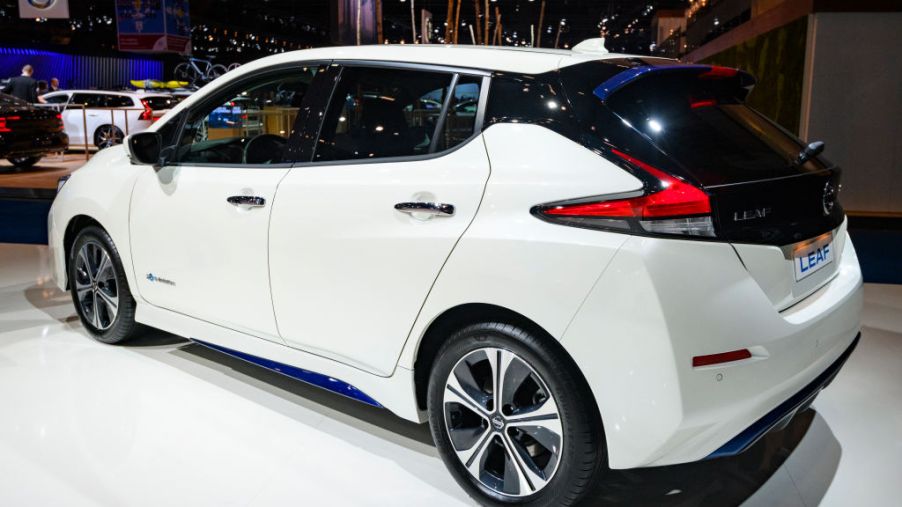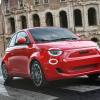
Does Anyone Regret Buying the Nissan Leaf?
When it comes to electric cars, the Tesla Model 3 or the Jaguar I-Pace is usually what most people think of first. Most aren’t aware of the Nissan Leaf and if they are, they likely don’t realize it’s been around since 2010. The Nissan Leaf is a worthy entry in the EV market. The 2020 models are nicely-equipped, spacious, and reasonably priced.
For those who have given the Leaf a try, are there regrets?
Nissan Leaf pros and cons
With heavy-hitters like Audi e-Tron out there on the market, smaller EV offerings like the Nissan Leaf are easy to overlook. While it’s not the most exciting EV out there, it has a lot to offer including a far more reasonable price than Tesla Model 3.
The Leaf, which is a competitor for other popular EVs like the Chevy Bolt, Hyundai Ioniq, and Kia Niro, does have a semi-autonomous driving mode that’s like the Tesla Autopilot. It just costs a lot less. You can get the base 2020 Leaf model for just over $32,000 with a 150-mile range.
Perhaps if the standard driving range were longer, the Leaf would get more love than it currently gets. It has more range than the e-Golf which has a 125-mile range. But it also has less than half the range of Tesla’s Model 3 Long Range models.
Still, the Leaf boasts an impressive list of standard features that grew longer in 2020. The new models have even more standard driver assistance features with the Safety Shield 360 bundle that includes blind-spot monitoring, forward collision warning, and lane-keep assist.
The infotainment screen is now 8.0-inches and there’s both Android Auto and Apple CarPlay integration. The controls on the dash look a little dated but that’s minor. The Leaf seats five with seats that are roomy and very comfortable. The rear seats don’t fold down though.
What to expect from Nissan Leaf
One of the least expensive EVs available on the market, the 2020 Nissan Leaf will draw the attention of those concerned with a budget, the environment, or both. As long as shoppers don’t look at the Leaf with expectations more realistic for a higher-end luxury EV like Audi’s e-Tron or the Jaguar I-Pace, they’ll find a quality all-electric vehicle.
Base Leaf models have a 110-kW electric motor that gets 147 horsepower to the car’s front wheels while the 40-kWh battery pack powers it. While the base models have a 150-mile range, the Leaf can get a range of 226 miles with the Plus trim level. The Plus has a more athletic 160-kW motor that gets 214 horsepower and has a bigger 62-kWh battery pack.
The Leaf gets good acceleration that again beats the Volkswagen e-Golf but it doesn’t measure up to the Bolt, BMW i3, or Model 3. There’s an e-Pedal feature that lets the driver shift between two regenerative braking modes. One mode lets the driver coast when they back off the throttle. The other slows the car, recycling the energy to boost the battery.
One advantage to prospective buyers is that the Leaf is still eligible for up to $7,500 in federal tax credits. It’s peers either can’t make that offer or can’t offer that much.
What owners think
Those who currently own a Nissan Leaf seem happy with the EVs for a variety of reasons. A user on Reddit asked other users if they had regrets in buying a Leaf.
The comments are largely positive. One owner says they regret not having a second one as opposed to a gas-powered car. Another regrets not getting a Nissan Leaf three years ago. One user went so far as to say that their life had been changed by their experience with Nissan Leaf. They explained that they would never revert back to a gas or diesel-powered car.
There were few drawbacks listed. One user said as long as you don’t mind having a backup car that runs on gas or renting a car for longer trips, owning a Leaf was ideal.
The 2020 Nissan Leaf starts at a reasonable price, offers an impressive list of standard features, and it gets a decent driving range. It works well for those who mostly need a vehicle for local travel.


